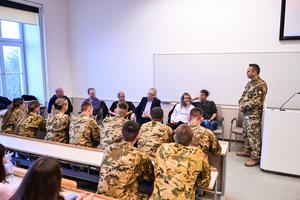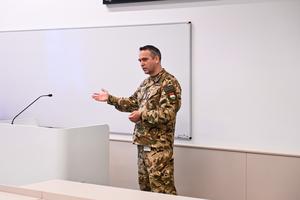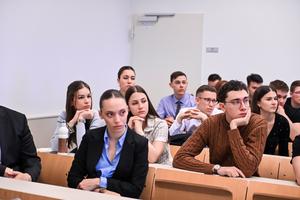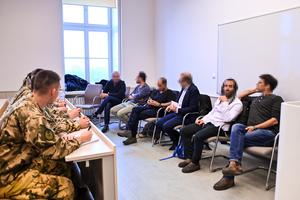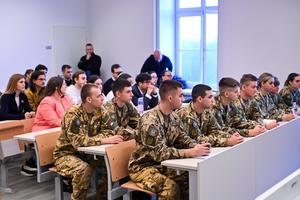On Monday, March 24, a special Israeli delegation visited the Ludovika University of Public Service. We had the honor of hosting members of an elite Israeli combat unit, who shared insights about their unit and battlefield experiences with our university students. The lecture was moderated by Lieutenant Colonel Ferenc Petruska, Vice Dean for International Affairs at FMSOT.
On October 7, 2023, Israel faced an unprovoked and brutal attack led by the Hamas terrorist organization. Since then, the region has been in a state of ongoing war. In Israel, military service is mandatory, so many reservists were recalled to duty on October 7. The soldiers who visited our university were among these volunteer reservists. Each of them had civilian careers, businesses, and families, which they had to leave behind when the fighting began, and they have been serving as active-duty soldiers ever since. Their unit has operated on all major fronts, including the Gaza Strip, Lebanon, Syria, and Judea & Samaria.
Their unit’s commander, Major (Res.) Amishar Ben David, recently fell in battle. His fellow soldiers shared heartfelt memories of him, highlighting his leadership and the qualities that define a great commander. They described a true leader as someone who takes responsibility and views their unit not just as soldiers, but as family. Major (Res.) Amishar Ben David embodied this philosophy, fostering a deep sense of unity beyond the battlefield by building personal connections with his troops and often welcoming them into his home.
Answering students' questions, the soldiers discussed what makes a good soldier, how they cope with the daily realities of war as reservists from different backgrounds, the difficult situations they face on the front lines, and how they deal with these experiences once they return home. They emphasized that a good soldier focuses on mastering their specific role to handle challenges effectively. Since they come from diverse professional fields, each soldier brings a unique perspective to the unit. The commander's role is to harmonize these different backgrounds into a cohesive team.
As they explained, despite commanders making many critical decisions, some of the hardest choices fall on the soldiers themselves—such as determining in the heat of battle when to fire their weapons and when to hold back. In urban warfare, they must be especially cautious to avoid harming civilians. This is not just a military order but also a moral duty.
As the soldiers explained, the toughest battle is not fought on the battlefield but after returning to civilian life, when they must mentally process their experiences. Even everyday sounds, like an ambulance siren or a sudden noise, can trigger battlefield memories. This is why psychological support is essential for them to fight this "battle" as well.
Our university students followed the Israeli soldiers' presentation with great interest, expressing their engagement through thoughtful questions. The Israeli soldiers were deeply moved by the warm reception and the genuine curiosity shown by the students.
Written by: Bátor Tietze
Photos by: Dénes Szilágyi
